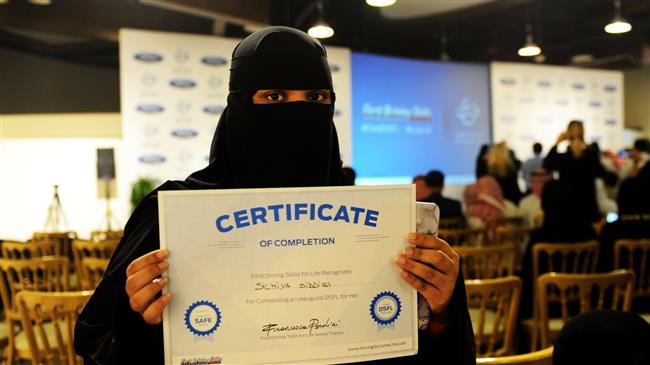Amnesty calls for immediate release of detained women’s rights activists in Saudi Arabia
Amnesty International has called on the “international community and allies of Saudi Arabia” to exert pressure on Riyadh to immediately and unconditionally release women’s rights defenders currently detained in the Arab kingdom.
“Saudi Arabia’s allies - in particular the US, UK and France - must push Saudi Arabian authorities to end their targeted repression of human rights activists in the country. European and world leaders must not stay silent in the face of gross and systematic violations of the human rights of activists and human rights defenders,” said the UK-based rights group in a statement on Friday.
“The Saudi Arabian authorities’ endless harassment of women’s rights activists is entirely unjustifiable, and the world must not remain silent on the repression of human rights defenders in the country”, said Samah Hadid, Amnesty International’s Middle East director of campaigns.
Over the past few weeks, a number of prominent women’s rights activists, including Loujain al-Hathloul, Iman al-Nafjan and Aziza al-Youssef, were arrested and still remained in detention centers without charge and incommunicado with no access to their families or lawyers.
Most of the detainees are prominent figures, who enjoy considerable respect among the Saudi grassroots, including university professors and a psychotherapist.
Saudi authorities have so far labeled the detainees “traitors”, infuriating the country’s rights activists who fear additional arrests amid much-hyped reports of reforms led by Saudi Crown Prince Mohammed bin Salman.
This is while reforms have been accompanied by heavy-handed crackdown on dissent against Saudi critics, ranging from clerics to some of the very female activists who campaigned for years to end the ban.
On Thursday, the European Parliament denounced human rights violations in the Arab kingdom and strongly urged the Al Saud regime in Riyadh to immediately release all detainees, including Nawaf Al-Rasheed and Raef Badawi, and stop discrimination against minorities. It also called on the Saudi government to speed up the pace of reforms and not just to make promises.
“The strong message sent by the European Parliament should be a catalyst for the EU’s Diplomatic Chief Federica Mogherini and EU member states to step up pressure on the Saudi Arabian authorities, and should also prompt others to follow suit,” Amnesty added.
During the past few weeks, Saudi authorities have arrested seven women and four men who were outspoken women’s rights defenders in the peninsular country, many of whom had campaigned against the long-standing ban on women drivers in Saudi Arabia.
The ban is scheduled to be removed this month, with licenses being issued from 24 June, making Saudi Arabia the last country in the world to permit women to obtain driving licenses.
In addition to agitating for women's right to drive, two detainees signed a petition in 2016 calling for an end to Saudi Arabia's male guardianship system, which requires women to obtain a male relative's consent for major decisions.
In September last year, Riyadh removed the driving ban on women as part of reforms to undo the damage the kingdom has suffered for decades of human rights violations both inside and outside of Saudi Arabia.
The move came shortly after women were also permitted access into a sports stadium, for the first time, to watch a concert. Saudi women had also been banned from voting until 2015, when they were allowed to vote in local elections.
In 2016, Saudi Arabia was ranked 141 out of 144 on the Global Gender Gap Index.
VIDEO | Iran-Syria: For Resistance
Qassam Brigades claims killing 3 Israeli troops in northern Gaza
More alive than ever: Sayyed Hassan Nasrallah's legacy grows stronger in martyrdom
Occupation of Syria’s highest peak Mount Hermon part of ‘Greater Israel’ project
Iran: Syrian people will decide their future without foreign interference
IRGC says Iran’s power exceeds borders, warns enemies to adjust themselves
Dozens detained, several wounded in Israeli raids in West Bank
‘Ethnic cleansing’: Hamas blasts Israeli attacks on Gaza hospital amid intl. silence
















 This makes it easy to access the Press TV website
This makes it easy to access the Press TV website